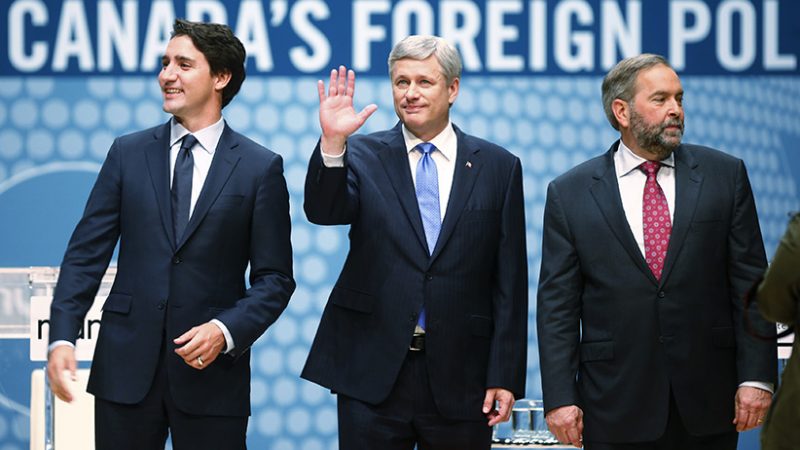
Our Foreign Policy
Our Foreign Policy needs serious overhaul. I believe the one big lesson that all countries should have learned from the Bush years is that no one nation, however powerful it may be, can “go it alone” for any significant period of time. Nations cannot advance their position in the world by thumbing their noses at others, stating their demands and then staking a “take it or leave it” position.
Yet, we seem to be the in process of doing exactly that. This is most evident when it comes to the Middle East, but also on other files (climate being the most prominent recently). We have already destroyed our relationship with the United Arab Emirates seemingly over landing rights for an airline. They kicked us out of a base we had been using gratis for the past ten years. We then had to move at a cost estimated at several hundred million dollars. In a world where walls are coming down and international trade and business are depending on freedom of movement, Canadians are now one of the few Western nationals that require avisa obtained ahead of time to enter the Emirates. Prior to this fracas, Canadians simply obtained a visa at the airport.
We have now also taken an adversarial position vis-à-vis Saudi Arabia. There is a campaign to label Saudi oil unethical (as opposed to our oil sands, which are trés ethical). Saudis believe the Canadian embassy in Riyadh is exceptionally obstructionist. From my own experience, it takes no less than 6 months for a physician to obtain the authorizations needed to begin residency training in Canada (for which the Saudi government pays us some $75,000 per year for each trainee).
The government of Saudi Arabia apparently feels that these are deliberate actions by the Canadian government and has instituted measures on the basis of reciprocity. It now takes some 45 days for Canadians to obtain a visa to enter Saudi Arabia.
Who the heck wants to go to Saudi Arabia or Dubai in the first place? Well, the government of Saudi Arabia just announced the budget for the previous year. Balance: Surplus of roughly $80 billion. (We have a deficit ~$30 billion). How will that surplus be spent? Infrastructure, health and education. Are there any Canadian companies that should want in on this boom? Probably. They need to wait 45 days. In case you’re wondering, the United States now routinely grants Saudis multiple entry, 5 year visas and the Saudis are reciprocating. But of course the United States did not experience a traumatic terrorist attack and we did. Wait, did I get that right?
Early in the course of the Egyptian Revolution, our government sent signals that an end to the Mubarak regime might not be such a good thing. Recently, our PM reiterated this position, saying that a post-revolutionary regime may in fact be worse than the Mubarak regime.
Let’s dissect this one out more:
– The previous regime was corrupt
– The previous regime drove the Egyptian economy into the ground
– The previous regime presided over a bankrupt educational system that saw Egyptian university delisted from world rankings.
– The previous regime detained Egyptians illegally and tried civilians before military courts.
– The previous regime tortured its citizens, in addition to other abuses.
– The previous regime systematically plundered the country for the benefit of a few individuals.
– The previous regime pitted one segment of society against the other.
– The previous regime was implicated in attacks against Copts (Egyptian Christians).
– The previous regime systematically extinguished the hopes, dreams and aspirations of an entire generation of Egyptians.
– The previous regime was friendly to Israel, assisted in the starvation of Palestinians by assisting in the inhumane blockade of Gaza and subsidized the Government of Israel by selling it natural gas at obscenely low prices.
What about the post-revolutionary regime? While it remains unclear who that will be, it is now obvious that Islamists, particularly the Muslim Brotherhood, will play a prominent role in it. The consensus in Egypt, even among the most skeptical, is that any post-revolutionary regime is most likely going to:
– Fight corruption
– Try to improve the economy
– Try to improve education
– Abolish military courts and illegal detention for civilians
– Abolish torture
– Try to improve the standard of living for average Egyptians
– ..etc.
Oh yes – I neglected to say that any post-revolutionary regime, Islamist or not, is unlikely to be friendly to Israel, to assist in the starvation of Palestinians or to subsidize the government of Israel.
When our PM makes the claim that the post-revolutionary regime is likely to be worse than the Mubarak regime, he is exclusively referring to that last point. For ordinary Egyptians, or for that matter, for Egyptian officials reading these statements, PM Harper’s priorities are painfully obvious. Canada prefers a regime that extinguishes any semblance of dignity and hope for Egyptians so long as it is a regime that protects the interests of Israel. When our PM prefaces these views by saying he has spoken to the PM of Israel and “we both agree…”, it leave little room for another interpretation.
Which leaves us with a simple question: If foreign policy is based on reciprocity, how should we expect the Government of Egypt to reciprocate?


